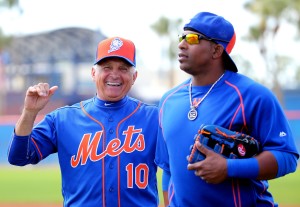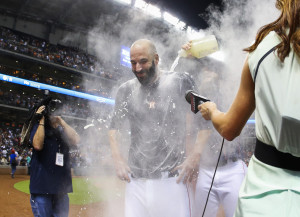Major League Baseball has concluded its investigation into 2018 sign-stealing allegations against the Red Sox and imposed the following disciplinary measures:
- The Red Sox are stripped of their second-round pick in the 2020 amateur draft
- Red Sox advance scout/replay coordinator J.T. Watkins has been suspended without pay for the 2020 season and is prohibited from holding his previous role for the 2021 season
- Former manager Alex Cora, fired by the Red Sox earlier this year, has been banned through the 2020 postseason — although only for his role in the Astros’ 2017 sign-stealing scandal.
Those penalties pale in comparison to what many felt was a light Astros punishment in response to their 2017 trash can scheme; Houston GM Jeff Luhnow and manager A.J. Hinch were both suspended one year (and subsequently fired by the team), while the organization was fined the maximum permissible $5MM and stripped of first- and second-round picks in each of the next two drafts.
Red Sox CEO Sam Kennedy issued the following statement via press release:
As an organization, we strive for 100% compliance with the rules. MLB’s investigation concluded that in isolated instances during the 2018 regular season, sign sequences were decoded through the use of live game video rather than through permissible means. MLB acknowledged the front office’s extensive efforts to communicate and enforce the rules and concluded that Alex Cora, the coaching staff, and most of the players did not engage in, nor were they aware of, any violations. Regardless, these rule violations are unacceptable. We apologize to our fans and Major League Baseball, and accept the Commissioner’s ruling.
The league announced the findings of what it terms an “exhaustive investigation into allegations of improper use of the video replay room.” Within, commissioner Rob Manfred offered the following breakdown of his findings:
- “I find that J.T. Watkins, the Red Sox video replay system operator, on at least some occasions during the 2018 regular season, utilized the game feeds in the replay room, in violation of MLB regulations, to revise sign sequence information that he had permissibly provided to players prior to the game.
- I find that unlike the Houston Astros’ 2017 conduct, in which players communicated to the batter from the dugout area in real time the precise type of pitch about to be thrown, Watkins’s conduct, by its very nature, was far more limited in scope and impact. The information was only relevant when the Red Sox had a runner on second base (which was 19.7% of plate appearances league-wide in 2018), and Watkins communicated sign sequences in a manner that indicated that he had decoded them from the in-game feed in only a small percentage of those occurrences.
- I do not find that then-Manager Alex Cora, the Red Sox coaching staff, the Red Sox front office, or most of the players on the 2018 Red Sox knew or should have known that Watkins was utilizing in-game video to update the information that he had learned from his pregame analysis. Communication of these violations was episodic and isolated to Watkins and a limited number of Red Sox players only.
- I find that the Red Sox front office consistently communicated MLB’s sign-stealing rules to non-player staff and made commendable efforts toward instilling a culture of compliance in their organization.”
Manfred goes on to emphasize that while he has previously granted players immunity in exchange for truthful testimony in both the Astros and Red Sox investigations, the findings of his Red Sox inquiry would not have led him to consider disciplining players anyhow (which surely would not have been the case with regard to the Astros). The loss of the draft pick, per the commissioner, stems from the fact that he still felt the organization should be held accountable for benefiting from data that was obtained improperly.
Manfred’s report on the investigation details that every player who spent time with the 2018 Red Sox was interviewed in some capacity and provided what were deemed truthful testimonies. A total of 65 witnesses were interviewed during the course of the investigation, and MLB’s department of investigations (DOI) reviewed “tens of thousands of emails, text messages, video clips and photographs,” per the report.
Watkins, the employee on whom the entirety of the wrongdoing is blamed by commissioner Manfred, was an advance scout tasked with using video to decode signs before and after Red Sox games — a permissible act that falls within MLB’s guidelines on the implementation of technology within the game. However, he was also the team’s replay reviewer, responsible during games for coordinating with Cora on whether to challenge a call or not. The report notes that other clubs had that same setup, but an investigation into the Red Sox found that Watkins would, at times, alter pre-game sign sequencing information in the middle of an active game. While most players who were interviewed said they had no knowledge of any wrongdoing by Watkins, others acknowledged that they had suspicions after the data coming from Watkins changed over the course of a game.
Watkins, per Manfred, has “vehemently denied” any such practice, although clearly based on the punishment levied by the league, Manfred and the DOI felt sufficient evidence to the contrary was present. Moreover, the commissioner’s report highlights that Watkins was a “key participant” in the 2017 Apple Watch incident that led to a fine for the Red Sox and helped bring questions about improper use of technology to light on a national basis.
With regard to any potential postseason wrongdoing, Manfred adds that the commissioner’s office positioned “full-time, in-person monitors in replay rooms to prevent the improper use of video equipment.” Such measures were not in place throughout the regular season.
It’s not yet clear precisely why the investigation was so prolonged in the first place and perhaps never will be. Major League Baseball was initially planning to release its findings before the end of February. When the investigation lingered into March, the COVID-19 pandemic obviously and understandably took precedence, thus bringing about a delay of nearly two months that only seems to have heightened the general public reaction that the Boston organization escaped mostly unscathed. But the initial delay into March was never fully explained.
The loss of that second-round pick will give the Sox one less selection in an already shortened draft and dock $1,403,200 from Boston’s pool (the would-be value of that vacated second-rounder). Previously, they’d been slated to have a $6.514MM pool in the event of a five-round draft and a $7.482MM pool for a 10-round format. Put another way, they’ll lose anywhere from 18.8 percent to 21.6 percent of their 2020 draft budget due to the league’s ruling.
Unexplained within Manfred’s report is just why the punishment for Cora, who was called out as an architect of the trash-can-banging setup with the 2017 Astros, is lighter than those which were brought upon Luhnow and Hinch. Cora’s rank within the organization was lower, but his role in the team’s transgressions appears to have been much more integral. Yet Luhnow and Hinch were banned for one year, beginning Jan. 13, 2020 and running through Jan. 13 of 2021, while Cora is only barred through the end of postseason play in 2020. Technically, he could have a job in baseball again before the bans on Hinch and Luhnow have been lifted — despite a pivotal role in the Astros’ scandal and, if not a direct role in the Red Sox’ 2018 infractions, then some negligence or a lack of oversight that one would think should be deemed alarming.
Ultimately, the light punishment for the Sox boils down to the fact that Manfred and his charges are convinced that the wrongdoing was more limited in scope than that of the Astros and largely fell on the shoulders of one employee. Fans and onlookers will, of course, draw their own conclusions about the legitimacy of that finding the the pervasiveness (or lack thereof) of similar setups throughout the league. At this point, however, that’s all largely rendered moot; the commissioner’s punishment has been set, and the matter has been put to bed.
The Red Sox announced not long after Kennedy’s statement that they’ll host a conference call with reporters tonight at 7pm ET, at which point they’ll surely field additional questions on the investigation and its ramifications.
Ken Rosenthal and Evan Drellich of The Athletic first reported the findings of commissioner Manfred’s investigation, minutes prior to the official announcement.






